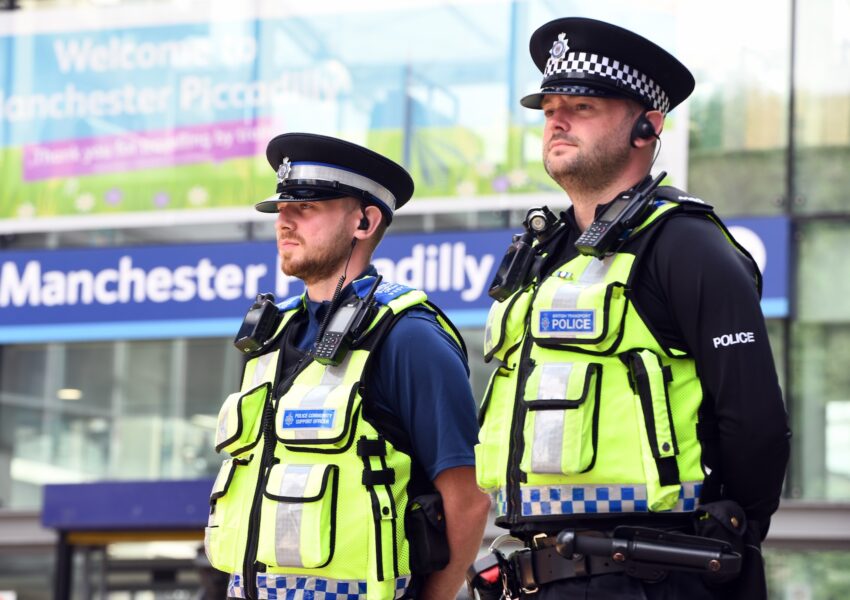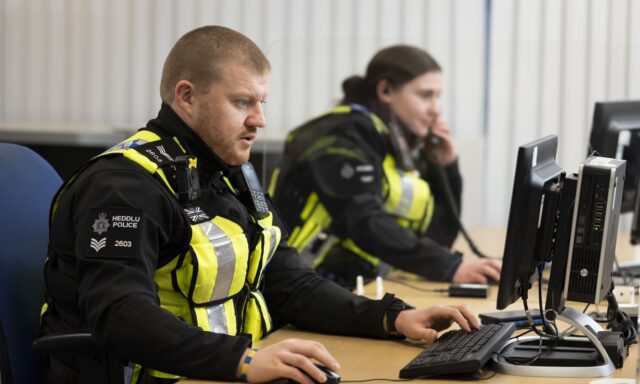British Transport Police delivers major digital transformation in mental health crisis response
04 August 2025

A groundbreaking mental health digital transformation programme has officially launched across England and Wales, bringing together thousands of police officers, NHS professionals, and frontline services.
As the UK’s only national police force, British Transport Police operates across multiple regions and NHS systems, making this the first time a fully digital Section 136 workflow has been rolled out at national scale.
The Thalamos MH Forms product, now in national use across British Transport Police (BTP), is replacing outdated paper-based workflows with a legally compliant, real-time digital system that spans every part of the Section 136 mental health crisis pathway. The deployment follows a successful two-month pilot in Manchester and Liverpool, and represents a marked evolution in how police forces and NHS services document legal processes and communicate in response to a mental health crisis.
British Transport Police Assistant Chief Constable Charlie Doyle said: “The introduction of the Thalamos digital platform marks a significant step forward in how British Transport Police and our NHS partners work together under the Mental Health Act. By moving to a secure, nationally consistent digital form, we’re making it quicker and easier for officers to complete the necessary paperwork, reducing administrative burdens and ensuring accuracy during pressured moments.
“The platform also streamlines the digital share and handover process with the NHS, creating a clear, auditable system that improves communication and reduces delays. Our priority is ensuring the best possible patient outcomes, and this new approach will help us work together more effectively to achieve that.”
BTP’s adoption of MH Forms brings a new level of consistency and visibility to the way Section 136 incidents are handled across the UK. Officers operating across England and Wales can now follow a single, clear, digital process, ensuring consistency for the people they serve and a better understanding of variation nationally. This is especially significant for BTP, whose officers frequently interact with multiple health and care systems while supporting the same service user.
Feedback from an early BTP user of MH Forms said:
“This has been a massive improvement for BTP and a very welcome change. The details can be updated throughout the incident rather than just completing a paper form at the 136 suite [place of safety]. It seemed to make the handover process a lot smoother and quicker.
The scale of national integration
With MH Forms now live across BTP, Thalamos is enabling a single digital process that spans more around 10,000 miles of railway track, 2,500 stations and hundreds of hospital and custody settings. This national deployment creates the first truly scalable digital infrastructure for monitoring, evidencing and improving Section 136 use in real time.
Thalamos CEO Arden Tomison said: “This programme demonstrates that digital transformation of the Mental Health Act is not just possible — it’s already happening. What we’ve achieved together with BTP and our NHS partners proves that national, joined-up change can be delivered with pace, precision and real impact.
“We’re proud to be working with an organisation that takes such a proactive approach to doing the right thing for people in crisis, and for the officers on the frontline who support them to access the health and care they need.”
Reducing disruption, improving productivity
The move to go live nationally follows the benefits already seen by police and health partners using MH Forms. In London, where Thalamos partnered with the Metropolitan Police, digitisation has been associated with reductions in incident officer involvement time and improved data quality for system leaders.
Commenting on the impact generated by use of Thalamos by the Metropolitan Police, Judith Fairweather, Deputy Director MH UEC, NHS England, said: “Digitising mental health processes at this scale is both rare and unprecedented. This was the first time paper-based workflows were fully replaced across a major city from the outset. It signified a genuine systemic transformation, overhauling the entire Section 136 pathway, rather than addressing isolated elements.
“More than just a workflow improvement, it has been driven by exceptional cross-sector collaboration and creates a level of integration never before seen in this area of care.”
By supporting clear roles, timely handovers, and greater accountability, MH Forms enables more effective collaboration between the police and NHS teams. For BTP, this is about improving outcomes for individuals in crisis while also boosting operational productivity and reducing unnecessary time spent in holding patterns or legal grey zones.
How MH Forms was built
Interested in the technology and collaboration behind MH Forms?
Find out how Thalamos worked with British Transport Police, NHS trusts and legal experts to design a digital solution that meets the real-world needs of frontline officers and clinicians.
Empowering officers with clarity and confidence
The national launch builds on Thalamos’ insight-driven approach to digital development. In partnership with both the Met and BTP, Thalamos has spent time listening to officer experiences of navigating mental health legislation in practice.
It’s clear that police often carry a heavy burden in these incidents — not just legally, but emotionally and morally. Officers feel the weight of public and media scrutiny, particularly when responding to vulnerable individuals. Many described going above and beyond their statutory role, staying with individuals in healthcare settings long after their formal duties ended, simply to make sure they were seen, safe, and supported.
That instinct is driven by compassion, but also by complexity. Officers are often asked to navigate differing expectations and procedures across Mental Health Trust boundaries. This is especially challenging for BTP, whose officers may work with multiple NHS partners in a single shift.
By creating a single, trusted workflow that aligns legal requirements with local practice, MH Forms reduces ambiguity and helps officers act with confidence. And unlike static paper processes, MH Forms creates a real-time digital trail that supports legal compliance and evidencing.
Driving a clearer national picture
The national adoption of MH Forms by BTP also brings major system benefits. For the first time, police and NHS leaders will be able to view a standardised, real-time digital record of all BTP Section 136 incidents across England and Wales. This will help identify patterns, spotlight pressure points, and improve service planning at scale.
It also complements Thalamos work with other police forces and NHS Trusts across the country. With each implementation, the quality and consistency of national data improves and supports better, fairer, and more responsive mental health crisis care for everyone involved.
A shared commitment to doing better
At the centre of the BTP programme is a shared commitment to improving outcomes for people in crisis. From officers on patrol to clinicians on call, the professionals involved understand the human stakes of mental health emergencies.
What the BTP rollout shows is that when national organisations are empowered with tools built for legal accuracy, clinical safety, and operational use, they can deliver significant results.
MH Forms is now live across the UK. And for thousands of police officers and NHS professionals, that means less paper, less uncertainty, and more time to focus on getting people the help they need.


